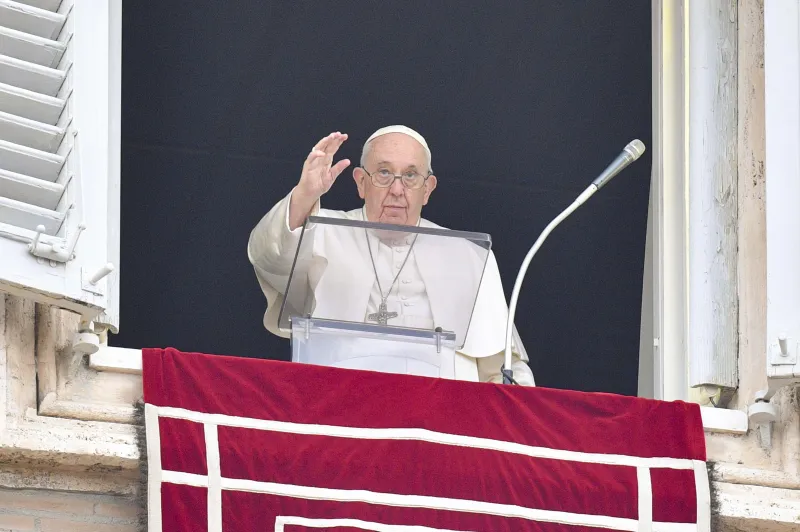
Vatican City, Jan 7, 2023 / 07:35 am (CNA).
Pope Francis on Friday issued a document reorganizing the Vicariate of Rome in what he called a time of “epochal change.”
The apostolic constitution, In Ecclesiarum Communione, replaces a 1998 constitution promulgated by Pope John Paul II. It goes into effect on Jan. 31.
“In arranging this new Constitution for the Vicariate,” Francis wrote in the preface, “in the face of an ‘epochal change’ that involves everything and everyone, I hope that it will be primarily an exemplary place of communion, dialogue and proximity, welcoming and transparent, at the service of the renewal and pastoral growth of the Diocese of Rome, an evangelizing community, a synodal Church, a people which credibly witness to God’s mercy.”
The bishop of the Diocese of Rome is the pope. Under him, the diocese, run by the vicariate, is led by a cardinal vicar, vicegerent (deputy), and auxiliary bishops.
Cardinal Angelo De Donatis is vicar of Rome, which has seven auxiliary bishops. Pope Francis on Jan. 6 appointed Rome auxiliary Bishop Baldassare Reina the vicariate’s new vicegerent. The pope also, with a decree, changed the assignments entrusted to each auxiliary bishop.
In the reorganization, Pope Francis emphasized a synodal approach, including the operation of an episcopal council, “the apex place of discernment and of pastoral and administrative decisions concerning the Diocese and Vicariate of Rome.”
According to the new constitution, the council, which consists of the vicegerent and auxiliary bishops, should meet at least three times per month, and be presided over by Pope Francis, or, in his absence, Cardinal De Donatis.
Article 1 of the constitution states that “every activity carried out within the scope of the Vicariate of Rome, at whatever level and with whatever degree of responsibility, is always by its nature pastoral, oriented according to the synodal style…”
In the constitution’s preface Pope Francis listed “some of the most serious and urgent commitments” of the Vicariate of Rome, including the proclamation of the Gospel, the witness of charity, the promotion of a synodal style and practices, the fostering of vocations to the priesthood and religious life, the administration of the sacraments, and the pastoral care of families and young people.
He also asked for prudent and vigilant economic management.
“The Church loses its credibility,” he said, “when it is filled with what is not essential to its mission or, worse, when its members, sometimes even those invested with ministerial authority, are a source of scandal by their behavior, unfaithful to the Gospel.”
Francis said this is not only a problem for the Church, but for those whom the Church is called to serve through the proclamation of the Gospel.
“In Rome, as in the other particular Churches, it is necessary to continue to listen to the voice of the Holy Spirit, who manifests himself even beyond the boundaries of ecclesial and religious affiliation, caring for a style that is sincerely hospitable, animated by the drive of the one who goes out to seek the many exiled from the Church, the invisible and the voiceless in society (cf. Mt. 22:9),” the pope said.
If you value the news and views Catholic World Report provides, please consider donating to support our efforts. Your contribution will help us continue to make CWR available to all readers worldwide for free, without a subscription. Thank you for your generosity!
Click here for more information on donating to CWR. Click here to sign up for our newsletter.




“Listen to the voice of the Holy Spirit, who manifests himself even beyond the boundaries of ecclesial and religious affiliation” (Pope Francis). As formulated His Holiness is technically saying “beyond the [doctrinal boundaries] of ecclesial affiliation”, which is the Church. As formulated he’s theoretically saying that there’s apposition between Church and Holy Spirit.
If this is correctly interpreted there’s an impossible disparity between the 3rd Person of the Trinity and the 2nd Person who instituted the Church.
For example, if Francis intended to technically say “beyond the boundaries of ecclesial affiliation” to mean the retention of doctrinal affiliation it wouldn’t be required to say beyond the boundaries of ecclesial affiliation. Nor that it would be “epochal change” [presumably in favor of a pastoral approach free of doctrinal containment]. The Gk epekhein suggests paradigm, entirely new or different.
Maybe a “paradigm” shift, but then maybe not so “new…”
Instad, reminiscent of the 12th-century Joachim of Fiore’s three epochal (!) ages–with the Age of the Father (Old Testament) displaced by the Age of Christ (up until A.D. 1260), and this epoch then displaced again by the Age of the Holy Spirit (not in A.D. 1260, but in A.D. 2023?). A dismembering and linear proposition/ideology which was condemned as heretical at the Synod of Arles in A.D. 1263. (A synod!)
But, which is also to say, historically, a “tradition”! And, then which might be asked, theoretically (and again synodally!): While all traditions are equally “backward,” are some traditions less equally backward than others?
I wonder if -and how- self-emphasis on the Church publicly declared and made “epochal” by more declaration, could ever be the way of the Church. I don’t know.
If you create openings for pedantry while denouncing formalism yet having people who are puzzled, as rigid, the whole thing isn’t amounting to a “synod”, I think.